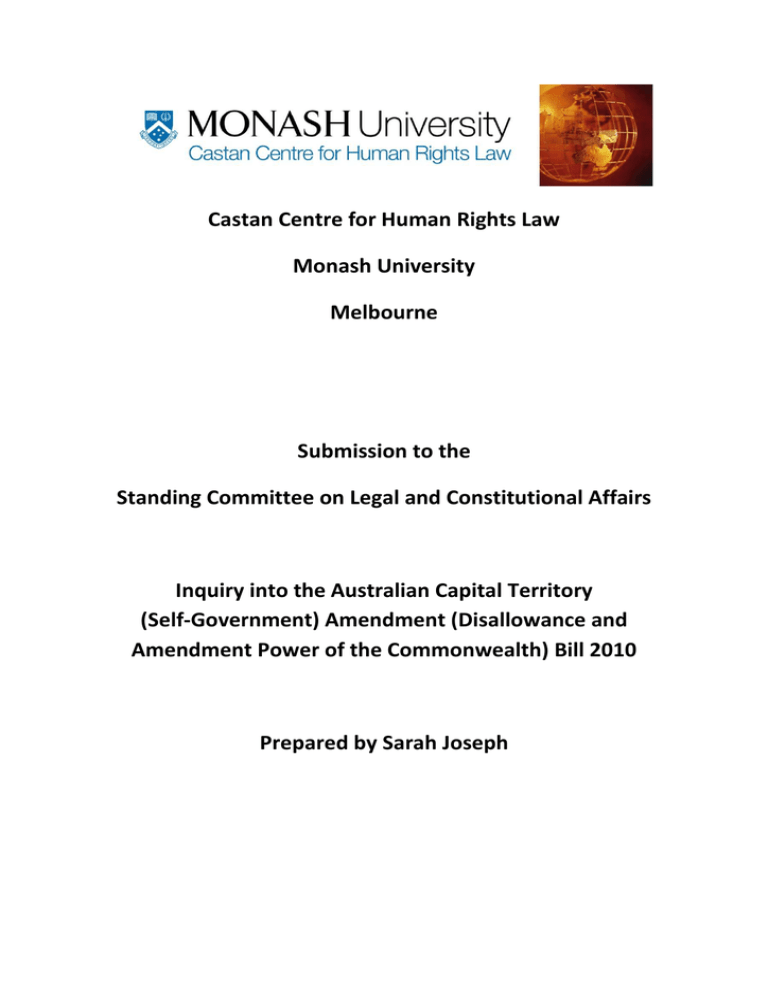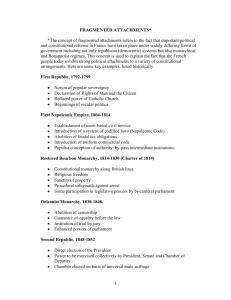Castan Centre for Human Rights Law Monash University Melbourne
advertisement

Castan Centre for Human Rights Law Monash University Melbourne Submission to the Standing Committee on Legal and Constitutional Affairs Inquiry into the Australian Capital Territory (Self-Government) Amendment (Disallowance and Amendment Power of the Commonwealth) Bill 2010 Prepared by Sarah Joseph Our submission on this Bill is very simple. We fully support it. It will enhance democratic rights in the ACT. At present, legislation emanating from territorial parliaments may be struck down by an exercise of executive power by the Governor General (acting on the advice of the responsible Ministers). In other words, the will of the people of the ACT, as represented by its Parliament, can presently be struck down on the basis that it does not conform to the will of the federal government of the day. The Territories do not have the status of States, and the Federal Parliament may exercise plenary power over them under s. 122 of the Commonwealth Constitution. That federal power will remain if this Bill is passed, and indeed can only be removed by a Constitutional amendment. The Bill does not and is not capable of elevating territories to the constitutional status of States. Under the Bill, the Federal Parliament would remain able to strike down any piece of ACT legislation. This is not the case with the States. If the Parliament wishes to override State legislation, it must be established that the Federal Parliament has constitutional power in the area in which it is seeking to strike down State legislation. The will of the federal government arguably represents the will of the House of Representatives given the government’s party normally has the majority in that House (though that is not the case presently). The passage of this Bill will therefore enhance the power of the Senate over territorial legislation. It may be argued that it passes power to the smaller parties or independents who often, on occasion, hold the balance of power in the Senate. Does that circumstance raise concerns, given that such parties or independents often lack widespread democratic support? It does not. No “balance of power” party can pass anything in the Senate without the support of at least one of the major parties. There is nothing “undemocratic” about giving the Senate the same power regarding the override of ACT legislation that it enjoys with regard to virtually all other federal legislative powers. It is far more democratic for such power to be exercised by the Senate than by the government acting unilaterally without any need to consult the federal Parliament. This is especially so at the moment, when the government party constitutes a minority in both federal Houses of Parliament. Concerns have been raised that this Bill will pave the way for the introduction of same-sex marriage legislation into the ACT. We will not comment here on the merits or otherwise of same-sex marriage. We concede that the Bill would facilitate the passage of such legislation in the ACT if the ACT legislature wished to pass it, as such legislation would be shielded from federal ministerial override (though it would not be shielded from federal legislative override). We submit however that this concern is irrelevant. The fact is that passage of the Bill will shield all ACT legislation from executive overrides. If the ACT was to “abuse” that power and “go mad” (to paraphrase A.V. Dicey), the federal legislature could override resulting legislation unless one of its houses also “went mad”. Article 25 of the International Covenant on Civil and Political Rights guarantees the right of political participation, including participation at all levels of government, including at “regional and local levels”.1 The right is most often exercised through elected representatives. While we would not go so far as to say that the present situation manifests a breach of Article 25, there is no doubt that the passage of this Bill would enhance the enjoyment of Article 25 rights by the citizen residents of the relevant Territories. 1 See UN Human Rights Committee General Comment 25, para 5.






